
FACULTY OF COMMUNICATION
Department of Cinema and Digital Media
CDM 350 | Course Introduction and Application Information
| Course Name |
Frameworks: Diverse Practices in Cinema
|
|
Code
|
Semester
|
Theory
(hour/week) |
Application/Lab
(hour/week) |
Local Credits
|
ECTS
|
|
CDM 350
|
Fall/Spring
|
3
|
0
|
3
|
4
|
| Prerequisites |
None
|
|||||
| Course Language |
English
|
|||||
| Course Type |
Elective
|
|||||
| Course Level |
First Cycle
|
|||||
| Mode of Delivery | Online | |||||
| Teaching Methods and Techniques of the Course | - | |||||
| Course Coordinator | - | |||||
| Course Lecturer(s) | ||||||
| Assistant(s) | - | |||||
| Course Objectives | Introduces and familiarizes the student with a wide range of diverse practices in cinema through examples of historical and contemporary artist works. |
| Learning Outcomes |
The students who succeeded in this course;
|
| Course Description | This course aims to familiarize the students with diverse practices in cinema. Examples of avant-garde, experimental and found footage cinema will be screened and its theories and artist practices will be discussed in class. |
|
|
Core Courses | |
| Major Area Courses |
X
|
|
| Supportive Courses | ||
| Media and Management Skills Courses | ||
| Transferable Skill Courses |
WEEKLY SUBJECTS AND RELATED PREPARATION STUDIES
| Week | Subjects | Related Preparation |
| 1 | Introduction- Short film ‘Meshes of the Afternoon’ (1943) by Maya Deren will be screened. | |
| 2 | Thinking in form I - Audiovisual experiments in narrative films and music videos. Excerpts from the films of A. Tarkovsky, C. Reygadas, P. Grandrieux, X. Dolan, L. Carax, M. Figgis will be screened. | Passages from Berger, John. Ways of Seeing (1990, Penguin) |
| 3 | Thinking in form II - Experimenting with the narrative, looking for new forms of storytelling. ‘Zayiat’ (2013) by Deniz Tortum will be screened. Excerpts from the films of D. Lynch, M. Haneke, M. Frammartino, J. Rosales will be screened. | Passages from Barthes, Roland. Camera Lucida (1982, Hill and Wang) |
| 4 | Auto-fiction I - Reconstructing the self in a fictional world. In what ways directors include themselves in their films. Excerpts from the films of N.B. Ceylan, W. Allen, Kim Ki Duk, J. Panahi, N. Moretti, A. Varda will be screened. | Meg Jensen “How Art Constitutes the Human: Aesthetics, Empathy and the Interesting in Autofiction” in Dix, Hywel. Autofiction in English (2018, Springer International) |
| 5 | Auto-fiction II - Allegory of the self. In what ways imaginary worlds can collide with directors’ own reality. Genco - Ali Kemal Çınar will be screened. | Passages from Hywel Dix, Autofiction in English (2018, Springer International) |
| 6 | Essayist approach - Narration and monologue. Visual and narrative strategies of contemporary essayist filmmaking. Excerpts from the films of J-L. Godard, C. Marker, G. Debord will be screened. | Timothy Corrigan “Essayism and Contemporary Film Narrative” in Papazian, Elizabeth; Eades, Caroline. The Essay Film: Dialogue, Politics, Utopia (2016, Wallflower Press) |
| 7 | Spatial cinema - How to tell the story of places? Excerpts from the films of G. Rosi, F. Wiseman, and D. Tortum will be screened. | Choose your subject of homework and final project. |
| 8 | Documentary in action I - Recording the perishable. Creative approaches and visual strategies in documentary filmmaking. Excerpts from the films of D. Vertov, J. Oppenheimer, A. Weerasethakul, M. Glawogger and W. Herzog will be screened. | Wilma de Jong; Erik Knudsen; Jerry Rothwell. “Life does not tell stories: structuring devices in documentary filmmaking” in Creative Documentary - Theory and Practice (2013, Routledge) |
| 9 | Documentary in action II - Resistance of the image. Creative approaches and contemporary narrative strategies in documentary filmmaking. Distant Constellation - Shevaun Mizrahi will be screened. Excerpts from the films of P. Costa will be screened. | Passages from Sontag, Susan. Regarding The Pain of Others (2004, Penguin) |
| 10 | Talking heads I - Truth or words. Creative methods of using interviews. Excerpts from the films of J. Rouch, L. Malle, K. Kieslowski will be screened. | Therese Davis “Reading the Face” in The Face on the Screen - Death, Recognition and Spectatorship (2004, Intellect Books) |
| 11 | Talking heads II - Fiction or words. Using interviews in fictional narrative cinema. 9 - Umit Unal will be screened. Excerpts from the films of A. Kiarostami, A. Yılmaz will also be screened. | Passages from The Face on the Screen - Death, Recognition and Spectatorship (2004, Intellect Books) |
| 12 | Queer forms for queer narratives - Excerpts from the films of E Williams, D. Jarman will be screened. | B. Ruby Rich “New Queer Cinema” Village Voice, 1992 |
| 13 | Found footage and the power of the archive - Excerpts from the films of M. Arnold, J. M. Salles, S. de Sousa Dias will be screened. | |
| 14 | Screening of students’ projects. | |
| 15 | Review of the semester | |
| 16 | Review of the final projects |
| Course Notes/Textbooks | |
| Suggested Readings/Materials | 1)Wees, William. Light Moving in Time 2) Taylor, Richard and Christie, Ian. Russian and Soviet Cinema in Documents 1896-1939 3) Essential Brakhage edited by McPherson, Bruce R., Documentext 2001 3)UBU Sound and Film Archive: http://www.ubu.com 2)The Early Video Project: http://davidsonsfiles.org/ 3)Radical Software Magazine, 19701974. Web Archive: http://www.radicalsoftware.org/ 4) The Internet Archive: http://www.archive.org 5) http://www.hi-beam.net/cgi-bin/flicker.pl |
EVALUATION SYSTEM
| Semester Activities | Number | Weigthing |
| Participation |
1
|
20
|
| Laboratory / Application | ||
| Field Work | ||
| Quizzes / Studio Critiques | ||
| Portfolio | ||
| Homework / Assignments |
1
|
30
|
| Presentation / Jury | ||
| Project |
1
|
50
|
| Seminar / Workshop | ||
| Oral Exams | ||
| Midterm | ||
| Final Exam | ||
| Total |
| Weighting of Semester Activities on the Final Grade | ||
| Weighting of End-of-Semester Activities on the Final Grade | ||
| Total |
ECTS / WORKLOAD TABLE
| Semester Activities | Number | Duration (Hours) | Workload |
|---|---|---|---|
| Theoretical Course Hours (Including exam week: 16 x total hours) |
16
|
3
|
48
|
| Laboratory / Application Hours (Including exam week: '.16.' x total hours) |
16
|
0
|
|
| Study Hours Out of Class |
16
|
2
|
32
|
| Field Work |
0
|
||
| Quizzes / Studio Critiques |
0
|
||
| Portfolio |
0
|
||
| Homework / Assignments |
1
|
10
|
10
|
| Presentation / Jury |
0
|
||
| Project |
1
|
30
|
30
|
| Seminar / Workshop |
0
|
||
| Oral Exam |
0
|
||
| Midterms |
0
|
||
| Final Exam |
0
|
||
| Total |
120
|
COURSE LEARNING OUTCOMES AND PROGRAM QUALIFICATIONS RELATIONSHIP
|
#
|
Program Competencies/Outcomes |
* Contribution Level
|
||||
|
1
|
2
|
3
|
4
|
5
|
||
| 1 | To be able to have fundamental knowledge about narrative forms in cinema, digital and interactive media, and the foundational concepts relevant to these forms. |
X | ||||
| 2 | To be able to create narratives based on creative and critical thinking skills, by using the forms and tools of expression specific to cinema and digital media arts. |
X | ||||
| 3 | To be able to use the technical equipment and software required for becoming a specialist/expert in cinema and digital media. |
X | ||||
| 4 | To be able to perform skills such as scriptwriting, production planning, use of the camera, sound recording, lighting and editing, at the basic level necessary for pre-production, production and post-production phases of an audio-visual work; and to perform at least one of them at an advanced level. |
X | ||||
| 5 | To be able to discuss how meaning is made in cinema and digital media; how economy, politics and culture affect regimes of representation; and how processes of production, consumption, distribution and meaning-making shape narratives. |
X | ||||
| 6 | To be able to perform the special technical and aesthetic skills at the basic level necessary to create digital media narratives in the fields of interactive film, video installation, experimental cinema and virtual reality. |
X | ||||
| 7 | To be able to critically analyze a film or digital media artwork from technical, intellectual and artistic perspectives. |
X | ||||
| 8 | To be able to participate in the production of a film or digital media artwork as a member or leader of a team, following the principles of work safety and norms of ethical behavior. |
X | ||||
| 9 | To be able to stay informed about global scientific, social, economic, cultural, political, institutional and industrial developments. |
X | ||||
| 10 | To be able to develop solutions to legal, scientific and professional problems surrounding the field of cinema and digital media. |
|||||
| 11 | To be able to use a foreign language to communicate with colleagues and collect data in the field of cinema and digital media. ("European Language Portfolio Global Scale", Level B1). |
|||||
| 12 | To be able to use a second foreign language at the medium level. |
|||||
| 13 | To be able to connect the knowledge accumulated throughout human history to the field of expertise. |
|||||
*1 Lowest, 2 Low, 3 Average, 4 High, 5 Highest
NEWS |ALL NEWS
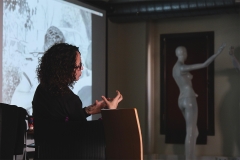
"Working with Found Footage" Workshop Organized with Zeyno Pekünlü
Artist, director, activist and academician Zeyno Pekünlü was the guest of CDM232: Digital Film Studio II.
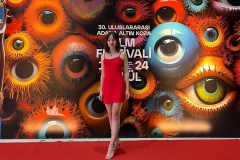
CDM senior year student Ecem has been selected to the Animation category at Adana Altın Koza Film Festival
CDM 4th-grade student Ecem Çörtle has been selected as a finalist in the National Student Films category of the 30th International Adana
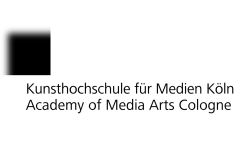
CDM graduate Eylül Berivan Kızılırmak has been accepted to the Cologne Academy of Media Arts
CDM graduate Eylül Berivan Kızılırmak has been accepted to the master's program at the Academy of Media Arts Cologne (Kunsthochschule für Medien Köln).
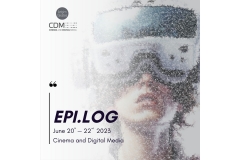
Traditionalistic CDM End of Year Exhibition EPI.LOG took place in FC Studios
Cinema and Digital Media End of Year Exhibition EPI.LOG 2023, organized as part of IUE Faculty of Communication Exhibition "FC-EX 2023", was
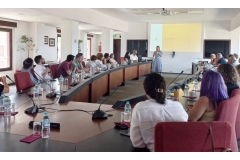
IUE Faculty of Communication Advisory Board members visited our Faculty and Studios on June 22, 2023
IUE Faculty of Communication Advisory Board members Andreas Treske, Ayşe Matay, Barbaros Görgü, Dilek Gappi, Elif Demirci İşleğen, Emine Uysal Berger, Murat
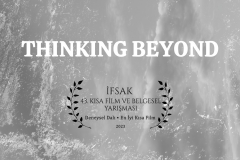
Ataberk awarded at the İFSAK 43rd National Short Film and Documentary Competition
Our third-year student, Ataberk Eyolcu, returned from the 43rd National Short Film and Documentary Competition of İFSAK (Istanbul Photography and Cinema Amateurs
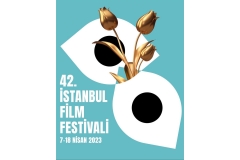
Our third-year CDM student Fikret Başar Kaya was at the 42nd Istanbul Film Festival
Our third year CDM student Fikret Başar Kaya participated as a Young Jury at the 42nd Istanbul Film Festival held on April
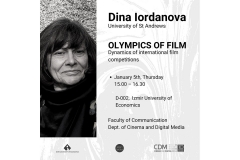
CDM hosted Dina Iordanova
Prof. Dina Iordanova gave a speech titled Olympics of Film: Dynamics of international film competitions on Thursday, January 5, 2023, in D002 at Izmir

